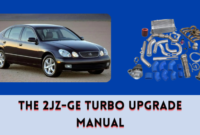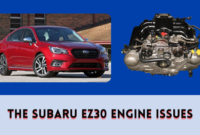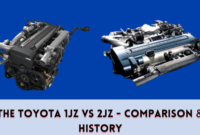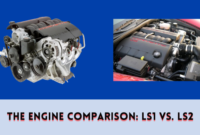Which EV tires are the best?. Electric cars (EVs) and hybrids have begun to dominate the new automobile landscape since storming into the market a few years ago. From Tesla’s and Lucid Motors’ all-electric high-performance vehicles to the PHEVs and mild hybrids offered by nearly every major manufacturer, one thing is certain: EVs and hybrids are here to stay. That doesn’t imply the internal combustion engine (ICE) will go away in the coming years, but we can anticipate manufacturers to continue to invest more in EV and hybrid powertrains than traditional ICEs. Except for GM, which is currently developing a completely new small-block V8.
With the introduction of EVs, there are new factors of car ownership to consider when compared to typical ICE-powered vehicles. Tires are one of the most vital. While it may appear strange at first, looking for and purchasing tires for EVs differs from that of gassers. Rolling resistance, tire noise, and higher curb weight are all considerations to consider when purchasing EV wheels and tires.
This article will teach you everything you need to know about selecting the best electric car tires for your vehicle. Price, performance, longevity, aesthetic appeal, customer happiness, and other factors are all considered. Let’s get this party started.
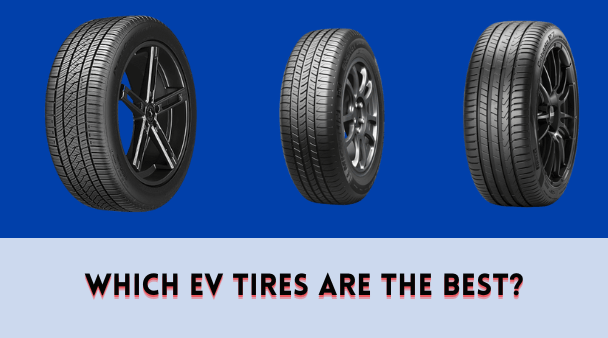
What exactly are EVs and hybrids?
Before we get into tires for EVs and hybrids, it’s important to understand the distinction between the two. If you’re looking for a new automobile, make sure to check out our previous articles on the best EVs for 2022 and the best hybrid SUVs for 2023. Obviously, EVs and hybrids are distinct from one another, but what are the many types?
EVs are exactly what they sound like: all-electric vehicles with no internal combustion engine. They run entirely on electricity and do not need gasoline, diesel, or hydrogen fuel. They instead have a battery pack that is charged by an electrical outlet, either at home or at a public charger. Individual motors, generally two or three, are powered by the battery and drive the wheels.
EVs are well-known for their ability to produce massive levels of horsepower and torque in an instant. Unlike an ICE, which must generate power over a powerband, EVs can deliver jaw-dropping torque from the moment the throttle is depressed. However, the more performance employed, the faster the battery depletes, demanding more frequent charge. Pure EVs are also prohibitively expensive, with many of the top options costing well over $100,000.
The Definition of Hybrids
Hybrids, on the other hand, combine both ICEs and EVs. Hybrids are classified into two types: mild and plug-in hybrids (PHEVs). Mild hybrids are powered by both a battery pack and an internal combustion engine (ICE), with the ICE powering the wheels and the battery managing electronics. When the automobile is halted, the ICE usually goes off to allow the battery to charge and then turns back on to power the wheels for take-off. In mild hybrids, the battery is charged while driving on the ICE, and in some situations, it can supplement the ICE’s output.
A plug-in hybrid electric vehicle, often known as a PHEV, is the other form of hybrid. PHEVs can power their wheels with either an ICE or an electric motor, and they can switch between the two. The auxiliary battery in PHEVs is large enough to power the wheels and drive the car for short distances, typically 30-50 miles. PHEVs, as one might expect, charge via an external power supply rather than by running the ICE.
When compared to pure ICE powered vehicles, hybrids are less expensive than EVs while yet providing higher fuel economy and lower emissions. Almost every manufacturer now has a mild or PHEV option in their inventory, and new versions are released on a yearly basis.
What distinguishes EV and hybrid tires?
As weird as it may sound, when selecting EV or hybrid tires vs those used by typical ICE powered vehicles, there are several factors to consider. While the terrain and conditions are generally the same, tires in an EV will behave differently from tires in a conventional automobile.
The additional weight and rapid torque kick of EVs put more strain on your tires than before. Furthermore, the absence of engine noise needs something quiet that will not constantly bother your ears while driving. Finally, on EVs and hybrids, having tires with low rolling resistance is critical for maximizing mileage and performance.
EV and hybrid tires are essentially the same as ICE tires, but have tire formulations that are better suited to heavier and more powerful vehicles. Most EV and hybrid tires can be used on regular ICE vehicles if desired, however they are primarily built for EVs and hybrids.
Things to think about while buying EV and hybrid tires
EVs produce far more horsepower and torque than normal ICE-powered vehicles. Because of the increased force, your tires will wear out faster than usual. Traditional tires will wear out much too rapidly to be viable, especially if you plan on using all of the 1,000 horsepower and torque that some EVs produce. They will also not handle nearly as well because your EV was most likely constructed with EV tires in mind.
The following issue is weight. EVs and hybrids typically weigh more than their ICE counterparts. Some hybrids feature two powertrains, which adds weight. Much of this is also due to the huge battery. It also doesn’t help that some electric vehicles have up to three electric motors.
As a result, you’ll require tires rated HL (High Load) or XL (Extra Load). These tires’ compositions are designed specifically for heavier cars such as EVs and hybrids. You’ll need tires with the right load index, as well as something grippy enough to help your car stop with all of that extra weight. Tires in the HL and XL sizes are designed to let you stop faster, even when carrying additional weight.
Rolling Resistance and Tire Noise
Noise comes next. Tire noise is still an issue in ICE automobiles, but it is considerably less visible. With the roar of the engine and exhaust, most people in ICE cars can’t hear their tires at all. However, because EVs don’t produce nearly the same amount of volume, you’ll notice your tires lot more clearly. As a result, you’ll need tires that don’t generate a lot of noise. Nothing is more annoying than driving with the windows down and hearing incessant shrieking and screeching from the road. Some tires are so loud that you can hear them through the interior of an electric vehicle.
Finally, rolling resistance is an important concern for EV and hybrid tires. The lower the rolling resistance of your tires, the greater the range of your vehicle. This is also true for tire size, as larger tires have a reduced overall range.
The Top 4 EV Tires
Let’s move on to the best EV and hybrid tires on the market. While this list will primarily pertain to EVs, it will also apply to hybrids. Here are the best four EV tires, taking into account pricing, performance, longevity, aesthetic appeal, customer satisfaction, and other factors:
- A/S Michelin Energy Saver
- PureContact LS Continental
- P7 Pirelli Cinturato
- LM-32 Bridgestone Blizzak
1) Michelin Energy Saver A/S Tire for Electric Vehicles and Hybrids
The Michelin Energy Saver A/S tires are first on our list. These tires are specifically designed for SUVs and passenger automobiles to be as fuel efficient as possible. They have reduced rolling resistance, making them ideal for EVs and hybrids. Michelin is a well-known brand in the tire sector that has been in operation for a long time.
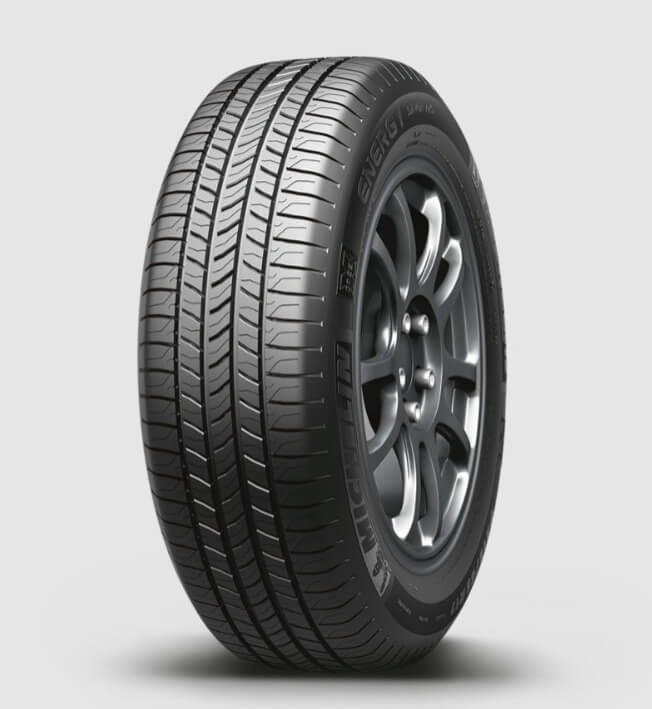
The Michelin Energy Saver A/S receives high grades for performance, handling, and noise. However, despite being an All Season tire, several customers have reported that it struggles to handle effectively in wet, snowy, and icy weather. If you live somewhere that gets a lot of rain, you’ll probably be alright, but if you live somewhere that gets a lot of snow and ice, you might need something else to move around safely in the winter.
Overall, the Michelin Energy Saver A/S is a reliable tire that offers low rolling resistance and reduced road noise while performing well in dry and moderately wet situations. It is built for fuel efficiency and economy, making it an excellent choice for EVs and Hybrids that do not see a lot of bad weather.
2) Continental PureContact LS EV and Hybrid tire
The Continental PureContact LS tire for EVs and hybrids is next on our list. The PureContact LS is one of the best electric vehicle tires for almost any vehicle. They are intended for sedans and coupes, as well as minivans and compact SUVs. They give outstanding handling performance and are said to be quite comfortable and quiet to drive on.
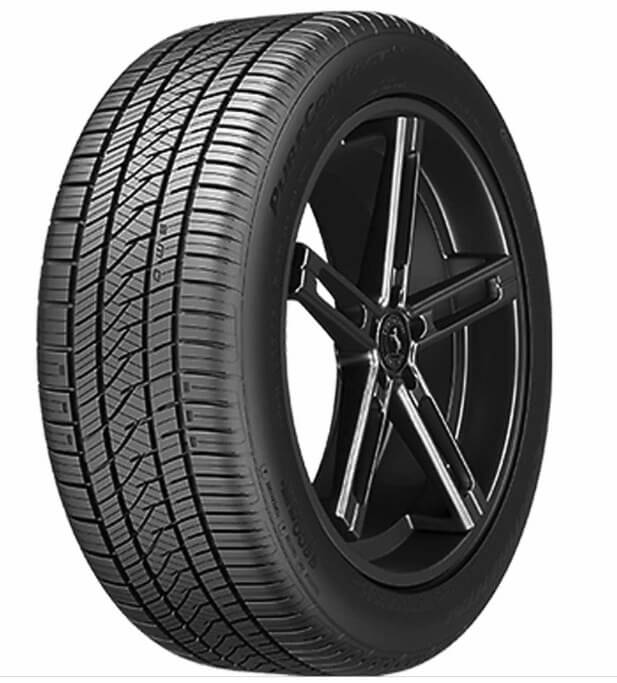
In comparison to the Michelin Energy Saver, the Continental PureContact performs significantly better in inclement weather. Even though it is an all-season tire rather than a winter tire, it receives rave reviews for handling in wet and snow situations. Part of this is due to the temperature triggered tread compound, which works exceptionally well when temperatures fall.
The PureContact LS is without a doubt one of the best EV and hybrid tires available. It combines performance and handling, with minimal road noise and exceptional wet weather handling. Continental has long been known for producing high-performance tires, and the PureContact LS is no exception.
3) Pirelli Cinturato P7 EV & Hybrid tire
The Pirelli Cinturato P7 tires are third on our list. Cinturato P7s are available in two varieties: super high performance Summer tires and Grand Touring All Season tires. Pirelli, like Michelin and Continental, is a well-known name in the tire industry. They are well-known for producing high-performance tires, which are usually superb.
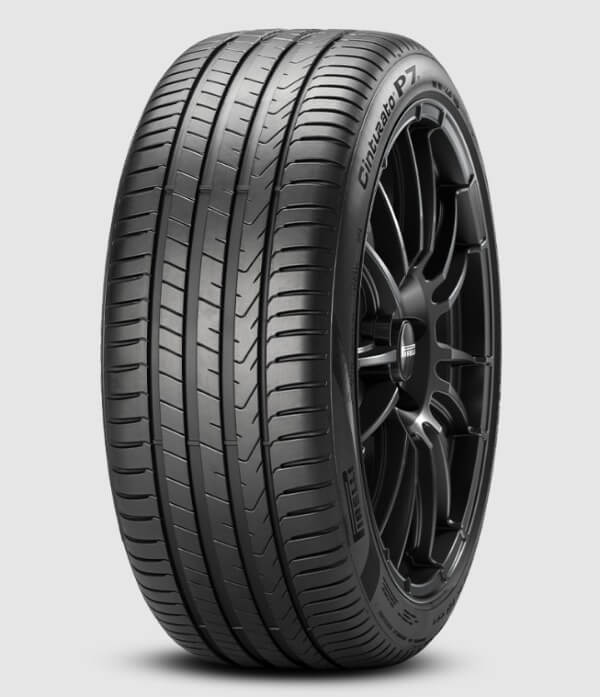
Both the Cinturato P7 Summer and All Season tires receive high grades for performance and handling. While the Summers will undoubtedly surpass the All Seasons, the All Seasons continue to perform admirably. They are relatively quiet while remaining sticky and gripping. However, in wet conditions, the P7s perform closer to the Michelins than the Continentals. Despite being marketed as an All Season vehicle, several customers report traction and handling concerns in wet and snowy situations.
The Pirelli Cinturato P7 is a good option for those seeking for a less expensive alternative to the Continental PureContact LS tires. They don’t have the same wet handling as PureContacts, but they work admirably in dry circumstances. The Pirellis, like the Michelins, are ideal for persons who live in mostly dry or somewhat rainy conditions. They will outperform in terms of performance and handling, but not in terms of fuel economy.
4) Bridgestone Blizzak LM-32 EV and Hybrid tire
The Bridgestone Blizzak LM-32s are our last pick for the best EV and hybrid tires. We wanted to include at least one winter tire on our list for individuals who live in snowy areas, and as anyone can tell you, Blizzaks are the industry standard for snow/winter tires that aren’t studded. They work admirably in subzero and snowy or icy weather. In the snow and ice, a FWD car with Blizzaks will outperform an AWD car with All Season tires.
When you put on the Blizzaks, there is a bit of a tradeoff. The first is increased road noise. Because of the Blizzaks’ remarkable stickiness and grippiness, you will often hear them significantly more on dry pavement. Furthermore, when temperatures rise, Blizzaks’ handling and grip will deteriorate. In hot weather, they will have significantly increased tire wear. However, for bad weather in the winter and early spring, few things outperform Blizzaks.
The pricing of Blizzaks will be another disadvantage. They are more expensive than standard summer or all-season tires, and they are even more expensive than many other snow tires. However, you definitely get what you pay for with the Blizzaks, which are the top of the range.
Related : The Port Injection vs. Direct Injection
Conclusion on the Best EV Tires
The optimum EV tire for your vehicle will be determined by a variety of factors, including your driving style, frequency of travel, weather conditions, and the vehicle itself. If you’re driving a sedan or coupe, you’ll undoubtedly want something with greater performance. If you own an SUV or crossover, you may be more concerned with traction and fuel economy than with precise handling.
We made four recommendations for the best EV and hybrid tires, each with its own set of advantages. The Michelin Energy Savers will be reasonably priced while yet delivering exceptional fuel efficiency and dry performance. The Pirelli Cinturato P7s will provide excellent handling and performance but will lack winter attractiveness. The PureContact LS tires from Continental combine the best of both worlds. They have superb dry and wet handling and are quite fuel efficient – albeit expensive. Finally, if you want the ultimate winter tire, the Blizzak LM-32s are the best option.


